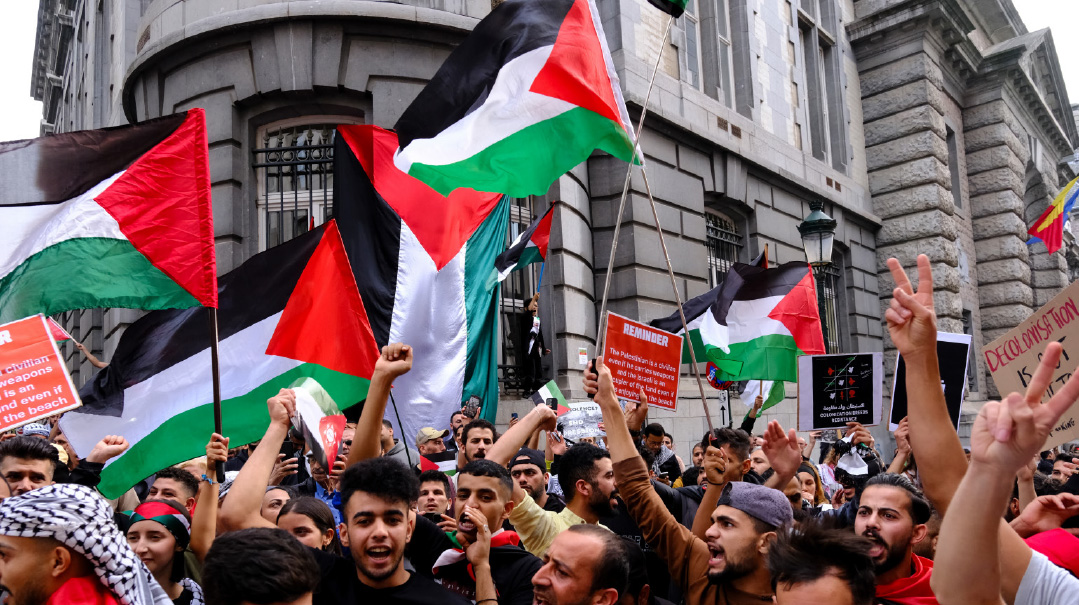Price of a Jewish Heart

“We’re Jews, and we have a Jewish heart, which means that our enemies can extort a terrible price from us”

Photo: AP Images
IF you’re not currently in Israel, it’s impossible to fathom how the homecoming of the hostages has gripped the country. On Sunday afternoon, as the haunted-eyed captives were being handed over to the Red Cross, normal business ceased. The least news-minded people imaginable followed with bated breath as the people they’d davened for so long made it home, against all the odds.
For the last week as well, the debate over the shockingly high price of the hostage release deal has raged. There’s little doubt that for all the joy at Jewish lives redeemed, the cost is catastrophic.
Hundreds of killers released to roam Yerushalayim and beyond; Hamas left standing to strut for the cameras and rule Gaza; the receding chances of ever getting all the hostages home.
After a week spent absorbing it all, the controversy has crystallized in my mind into a few familiar lines that we say every Monday and Thursday — phrases that combine ineffable Jewish sadness with staunch Jewish faith.
“Habeit mishamayim ure’eih,” we say in Tachanun per the ArtScroll translation: “Look from Heaven and perceive that we have become an object of scorn and derision among the nations; we are regarded as the sheep led to the slaughter, to be killed, destroyed, beaten and humiliated.”
Seeing those defenseless Jewish girls under the guns of the faceless Hamas brutes, forced to run the gauntlet to the Red Cross vehicles while the Gazan mob hollered and jeered — what better description for that medieval scene is there than those ancient words?
The comparison runs deeper than just the visuals. Think about the dynamics that led to this impossible Mishpat Shlomo-like decision, as we’re forced to choose between saving hostages and the terrible certainty of future repercussions.
Why, as one friend put it, has Israel emerged the loser after smashing the enemy?
The answer is simple: We were obliged to defend ourselves on terms that only apply when Jews are forced to fight. From the very beginning of the war, it was made clear to us by our international friends that we could fight — but not too much. We could win — but not too decisively.
At risk of belaboring what is now a truism, which other country is forced to provide massive aid to its enemy? The Biden administration’s strong early support quickly conditioned the flow of vital weapons on the aid that guaranteed Hamas’s continued existence.
Israel’s decision early in the war not to hold Gazan territory — but instead to conduct targeted operations and retreat — also ruled out Hamas’s destruction. That strategy avoided keeping tens of thousands of reservists permanently in the field. But it was primarily based on the certainty that Western allies would never allow Israel to retake Gaza properly. Obsessed as they were with dreams of Palestinian statehood, the Biden administration foreclosed any possibility of Israeli victory.
The bottom line is that in the 21st century, when Jews are led like sheep to the slaughter, somehow the normal rules don’t apply. In the twisted view of much of the West, the Palestinian perpetrator is the victim, and the world’s only Jewish state is held to a unique standard. Israel is forced to fight with one hand tied behind its back, and denied the legitimacy to wipe out the terrorists who inflicted genocide.
It’s early days, and we don’t yet know the terms of the deal that the incoming Trump administration forced through, with Middle East advisor Steve Witkoff reportedly bullying Bibi into concessions. It may contain a significant quid pro quo for the massive Israeli giveaways, such as a commitment to tackle Iran’s nuclear program, which would transform the terms of the deal.
But as things stand, it doesn’t feel like Hamas has to sacrifice as promised — instead, it feels like Israel is being made to pay for Trump’s vow to bring about a ceasefire.
Amid the bitter reality of the hostage deal the same passage from Tachanun holds out comfort.
“But despite all this” — the scorn and derision, the cheapness of Jewish blood — “we have not forgotten Your Name.”
How true those words are.
As the hostages were being transferred, I was in a taxi, and the driver — a mesorati man and staunch Bibi voter — held forth about the disaster of the deal. “It’s terrible — all those killers being released, Hamas cruising around in celebration as if they’d won the war — what did we fight for?” he wondered.
But then he added his own conclusion. “I asked someone close to Itamar Ben Gvir, who opposed the deal, ‘What would you say if it were your son or daughter — would you turn it down?! Would you?!’ ”
“We’re not like Putin, who would refuse to negotiate with terrorists,” the driver said. “We’re Jews, and we have a Jewish heart, which means that our enemies can extort a terrible price from us.”
As he counted out change, he gestured heavenwards, as if quoting from the ancient words that describe our modern reality so well. “Whatever happens, it’s up to Him,” he said.
(Originally featured in Mishpacha, Issue 1046)
Oops! We could not locate your form.







